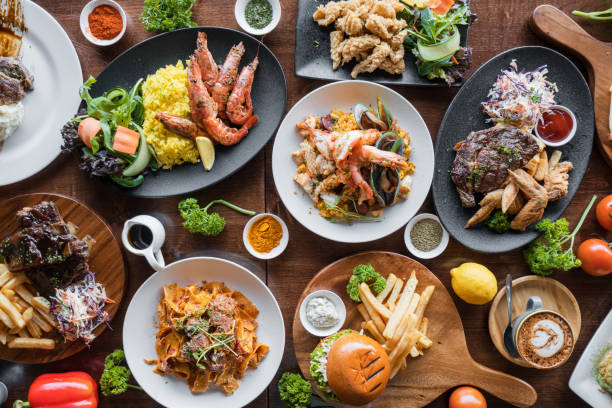Contents
Introduction:
In the dynamic world of restaurant management, one of the key pillars of success is effective food and beverage control. From ensuring cost efficiency to maintaining quality standards, mastering the basics of food and beverage control is paramount for every restaurant manager.
In this blog post, we’ll delve into the fundamental concepts every manager should master, the objectives behind implementing food and beverage control, the limitations to be aware of, and the undeniable importance of this practice in running a thriving restaurant.
Objectives of Food and Beverage Control Include :
Effective food and beverage control serves a number of crucial goals that together support the efficient running and financial success of a restaurant. These goals include:
Cost Management:
Controlling costs is one of the main goals of the food and beverage industry.
Restaurant managers can find chances to cut waste, adjust portion sizes, and bargain better prices with suppliers by carefully monitoring the costs linked to inputs, production, and service.
Maintaining Quality Standards:
Consistently high-quality food and drinks are served thanks to food and beverage control.
Restaurants may uphold the same high standards for flavor, presentation, and the overall dining experience by carefully controlling inventory and keeping an eye on the use of products.
Optimizing Menu Planning:
Controlling food and drinks entails assessing the acceptance and profitability of menu items.
This data-driven approach helps managers make informed decisions about menu composition, pricing, and promotional strategies to maximize revenue.
Preventing Theft and Pilferage:
Effective control measures discourage employee theft and pilferage, contributing to a more transparent and trustworthy operation.
Proper monitoring of inventory levels and tracking of sales can help identify discrepancies and address potential issues.
Read Also :
How Corporate Training Improves Emergency Nutrition Response
Limitations of Food and Beverage Control Include :
While food and beverage control is essential, it’s important for restaurant managers to be aware of its limitations:
Human Factors:
Human errors in recording sales and tracking inventory can lead to inaccuracies. Staff training and clear procedures are vital to minimize errors.
Market Fluctuations :
External factors like price changes in ingredients and shifts in consumer preferences can impact cost control efforts.
Flexibility is key to adapting to market fluctuations.
Unpredictable Demand:
Restaurants often face variations in customer demand, which can lead to challenges in maintaining optimal inventory levels and portion control.
Varied Portion Sizes:
Consistency in portion sizes can be challenging to maintain, leading to discrepancies between theoretical and actual usage. This can result in inaccurate cost calculations and inventory management.
Recipe and Menu Changes:
If menu items or recipes change frequently, it becomes difficult to accurately predict ingredient usage and costs. New items may not have historical data for accurate forecasting, leading to potential discrepancies.
Waste and Spoilage:
Food items have a limited shelf life, and perishable items are susceptible to spoilage. Even with proper inventory control, some level of waste and spoilage is inevitable, affecting cost calculations and profitability.
Theft and Pilferage:
Employee theft or unauthorized consumption of inventory can skew usage data and lead to higher costs than anticipated. Detecting and preventing theft can be challenging, especially in larger establishments.
Technology Dependence:
While technology can enhance control systems, it can also introduce vulnerabilities. Technical issues, software glitches, or system failures can disrupt the accuracy of food and beverage control systems.


Importance of Food and Beverage Control in a Restaurant Include :
Food and beverage control is a crucial aspect of restaurant management that plays a significant role in ensuring the success and profitability of the establishment.
Here are some important reasons why food and beverage control is essential in a restaurant:
Cost Management:
By precisely controlling the amount of ingredients used, portion sizes, and waste, effective dietary and beverage control aids in cost management. This guarantees that the restaurant is running profitably and cutting back on wasteful expenses.
Profitability:
By controlling costs and reducing wastage, restaurants can enhance their profitability. Accurate tracking of expenses and revenue helps in identifying areas where adjustments can be made to improve the bottom line.
Inventory Management:
Food and beverage control systems help in maintaining optimal inventory levels. This prevents overstocking or understocking of ingredients, which can lead to financial losses and operational disruptions.
Menu Pricing:
Proper control of food and beverage costs enables the restaurant to set appropriate menu prices. Pricing items accurately ensures that the business covers its costs while remaining competitive in the market.
Quality Assurance:
Control systems provide uniformity in the food and beverage quality. Customers can enjoy a uniform dining experience by standardizing recipes, portion sizes, and preparation techniques.
Waste Reduction:
Accurate control systems minimize food wastage and spoilage, reducing the environmental impact and contributing to sustainable practices.
Fraud Prevention:
Food and beverage control systems help detect and prevent employee theft, unauthorized consumption, or misuse of ingredients. This safeguards the restaurant’s assets and maintains integrity.
Supplier Relations:
Restaurants can improve their negotiating position with suppliers by keeping track of their ordering and ingredient consumption habits. They can decide when and how much to order with knowledge, thereby saving money.
Forecasting and Planning:
Historical data from control systems assist in forecasting demand and consumption patterns. This enables the restaurant to plan for busy periods, seasonal variations, and special events effectively.
Regulatory Compliance:
Restaurants are subject to various regulations and standards related to food safety and quality. Proper control systems help in maintaining compliance and avoiding potential legal issues.
Operational Efficiency:
Accurate control systems streamline operations by providing insights into production schedules, staffing requirements, and kitchen workflows. This leads to smoother day-to-day operations.
Menu Development:
Data from food and beverage control systems can guide menu development decisions. Restaurants can identify top-performing items and trends, leading to informed menu expansion or adjustments.
Performance Evaluation:
Control systems provide data on the performance of different menu items, allowing the restaurant to assess which dishes are most popular and profitable.
Decision Making:
Managers can make informed decisions about menu changes, pricing adjustments, and cost-cutting measures based on data from control systems.
Customer Satisfaction:
Consistency in quality, portion sizes, and taste enhances customer satisfaction, leading to repeat business and positive word-of-mouth referrals.
Conclusion :
Food and beverage control is essential for maintaining financial stability, operational efficiency, and customer satisfaction in a restaurant. It helps in managing costs, improving profitability, and making informed decisions that contribute to the overall success of the establishment.
Don’t miss this opportunity! Register now and unlock your full potential with our transformative course.
We have a firm belief that every organization has a unique purpose only they can fulfil in this world. We work with you in organizing your resources to exploit opportunities so that you can fulfil your purpose and realize full potential. We build the capacity of people, processes and systems for organizational success and growth as well as nurturing a thriving ecosystem.
Ready to enhance your skills and boost your career? Explore our corporate training programs now and start your journey to success.








Comment here